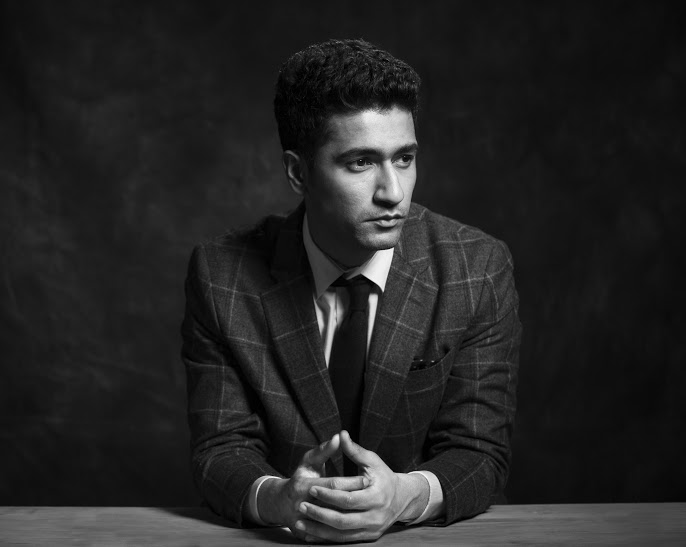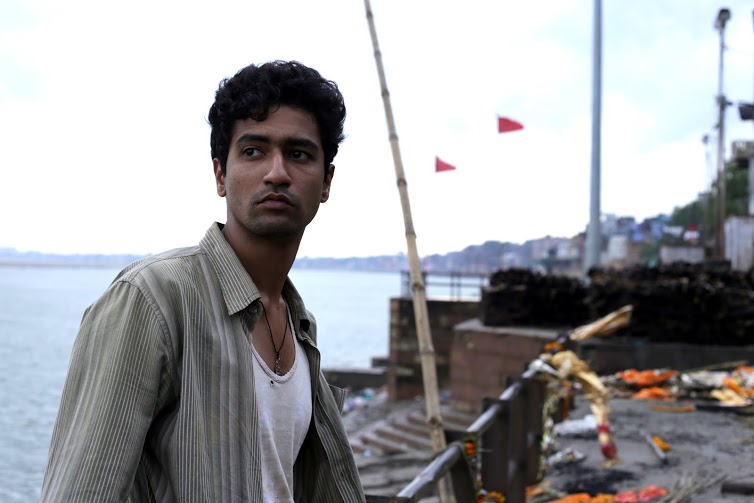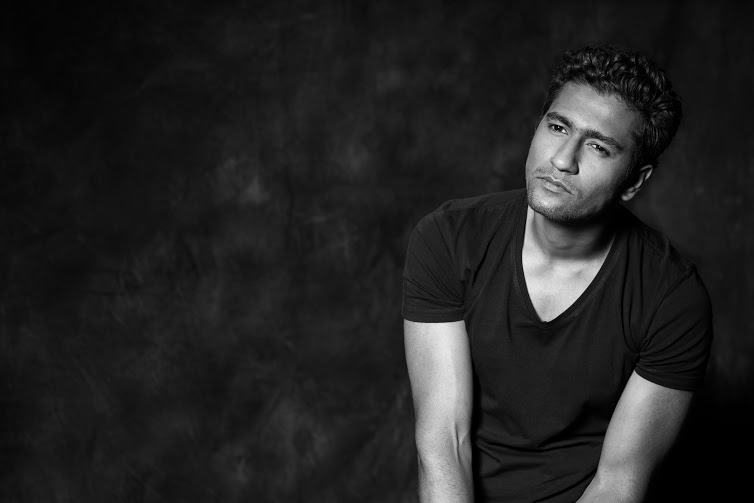During one of the many special screenings of Masaan in Mumbai, Shabana Azmi came up to Vicky Kaushal and said incredulously, “Tum kaun ho? Kya kaam kiya hai tumne! (Who are you? What an amazing job!) Come, you must meet Javed saab!’’ Javed Akhtar who was coming out of the theatre just at that moment, said the exact same thing, “Kaun ho tum bhai?” After the screening, Akhtar held Vicky’s hands and said, “Mere paas alfaaz nahin hai’’ (I have no words to describe your work).
Says Vicky with a sense of wonder in his voice, “For Javed Akhtar to say..he had no words..this was a huge compliment.’’
Later, Amitabh Bachchan’s complimentary message to his father, action director Shyam Kaushal, kept Vicky awake through the night. He says,”I read that message hundreds of times..that Amit ji had spent a minute possibly thinking about my work and liking it and messaging my father..was overwhelming.’’
But the young kid who wore a natty suit in Cannes, beamed at armies of international photographers and took a selfie with Michael Caine refuses to buy into the idea that success can alter him or dim his passion for the real work that goes into being a credible actor. The breakout star of Masaan says,”I was born in a 10 by 10 room in a Mumbai chawl without a separate kitchen or bathroom. I saw my father working hard everyday to reach where he has today. I have his example to follow. I always knew that you cannot get anywhere without working hard.’’
Vicky never went to the sets where his father worked either, was shy and introverted but during school functions, if he got a chance to perform on stage, he felt “liberated, almost as if I had now the chance to be shamelessly free!’’
He also grew up on a staple diet of films being shown on cable TV. One story everyone knows about him now is how Hrithik Roshan’s Lakshya made him want to do “something..anything.’’
But he adds, “My father never discussed films at home. He kept the personal apart from the professional.’’
It was however during the sedate field trips as a budding engineer that Vicky started feeling restless and began to visit his father’s sets where he says, “I would be given a chair to sit, offered ‘chai and thanda’ but never allowed to be where people were working really hard to create something.’’
He noticed that the person doing the maximum amount of work and being shouted at the most was the AD and he decided to assist a director he could learn from. He ended up meeting Anurag Kashyap, assisted him during the making of Gangs of Wasseypur, met Neeraj Ghaywan on the sets who then cast him in Masaan.
“I signed two films..Masaan became my debut film but Zubaan, the second film is now on its way. This is a coming-of-age story of a musician and you will see me in a more conventional, commercial space.’’
In a chat, Vicky Kaushal talks about the definitive moments of a landmark film he feels blessed to be part of.
‘The toughest scene in the film was unscripted’
About one of most devastatingly moving moments ever filmed where his character Deepak doubles up in pain and howls with an almost primal grief, he says, “We workshopped extensively before the film, locked the vibe, the gestures, the expressions, the lines that we thought worked best for most scenes but we left this scene untouched. We did not want it to look too mechanical but Neeraj, Varun Grover and I talked about loss, we shared our experiences, I imagined what it would be like to lose someone you love in a snap..what I would go through if my mother wasn’t there if I woke up in the morning and when I get home at night..the small moments that I take for granted now..how much I would miss them. On the day we were to shoot this scene we had wrapped up some work already and I had the window of an hour-and-a-half. I got the make-up done and sat on the ghat alone. The aarti bells were chiming and nobody in the unit spoke to me. I had always wondered just what liquor does to the human mind and when Neeraj asked me if I wanted a few sips before the scene, I agreed.”
He continues, “Neeraj told me just before we started rolling, ‘Do it the way you want..I don’t care if you take 10 seconds or 10 minutes. Go with the flow..go where it takes you.’ There were five lines that I needed to say..I said those lines and the scene was over but Neeraj never says, ‘cut’ immediately after a shot. He waits for the actor to do something instinctively beyond the script. And just then a train thundered past and it triggered in me a memory of the poem Shalu (the character played by Shweta Tripathi) loved..‘tu kisi rail si guzarti hai’ and then that led to the last thing she said to my character, ‘bhaag ke jaana pada toh bhaag bhi jayenge’ (If I have to elope with you..I will).”
“I repeated these lines because I had always felt that for Deepak, to find a girl who could love him this much would mean the world, given the lacks he has grown up with. And then to lose her would mean the end of the world. Then I said a line Varun had written, ‘ye dukh khatam kyon nahin hota,’ and then the crying began in waves and did not stop. ”
Vicky still feels shaken by the memory and recalls how the co-actor who played his best friend KK in the film, held him tight and did not let go for over two minutes because he was shivering so much. “Neeraj came and started wiping my tears and I said, ‘sorry, the make-up is ruined..sorry..you didn’t get what you wanted.’ And he said, ‘Are you crazy? This is exactly what I wanted.’’’
Finally, the scripted bit was edited out and this improvised part made it to the final cut. Usually, it is hard to control the crowd on the ghat but on this night, there was not a sound. There was complete silence, shares Vicky.
‘The unsaid was more important than what was said’
Tell Vicky that the scene where Deepak and Shalu meet for the first time at a cafe reminds one of the innocence and guilelessness of Faroque Sheikh and Dipti Naval in Chashme-Baddoor and he exclaims, “Arre, baap re!’’
But yes, the workshops helped in establishing the right ‘sur’ of the scene, he says and adds, “The way Deepak blushes…came from the workshops and Varun’s writing helped a lot. In so many scenes, what was written between the lines was more important than what was spoken. In this scene too, Deepak is trying to sound credible and confident when he is talking about how he would have got a job by now but for a strike in his college. He is pretending to be everything he is not. He is the kind of a boy who blushes even when he looks at the printout of her Facebook profile and here he is sitting opposite her, trying to impress her somehow. The girl sees though his false bravado too and asks him, ‘aur aap kya karenge?’ when he tells her that if anyone ever troubles her, he would take care of it. She knows he is faking it.’’
‘I like to touch a zone as an actor’
Ask him if he will ever get the same luxury of detailing a character and says Vicky, “I hope I will get that space always. A lot of things fell into place on Masaan’s sets because we workshopped so much and I was told by Varun and Neeraj, ‘Surrender to Banaras, walk its streets, be lost here and you will begin to find something.’ I spent weeks walking in the city, observing people, sitting at Manikarnika Ghat. Yes, you can say, I internalised Deepak and I would always want to work this hard to become a character. There are great actors like Richa Chaddha and Sanjay Mishra who can switch on and off and I learnt a lot from them. But I can’t do that yet. I need some quiet time before a shot to go deep and find the right pitch.’’
‘The film is always bigger than an actor’
And no, he won’t ever be dazzled by his own self-importance because his father taught him a fundamental lesson in humility. He says, “The film fraternity has been very kind and supportive of Masaan and I want to thank everyone for the love we have got. I learnt from my father though that a film is always bigger than an actor. It is a film that makes an actor, always. The film is the hero. And if you stay on your path, keep working hard, then good things happen. Never before. I want to keep giving my 110 per cent to every film I do.’’
Reema Moudgil works for The New Indian Express, is the author of Perfect Eight, the editor of Chicken Soup for the Soul-Indian Women, a translator who recently interpreted Dominican poet Josefina Baez’s book Comrade Bliss Ain’t Playing in Hindi, an artist, a former Urdu RJ and a mother. She won an award for her writing/book from the Public Relations Council of India in association with Bangalore University, has written for a host of national and international magazines since 1994 on cinema, theatre, music, art, architecture and more, has exhibited her art in India and the US…and hopes to travel more and to grow more dimensions as a person. And to be restful, and alive in equal measure.









 with
with